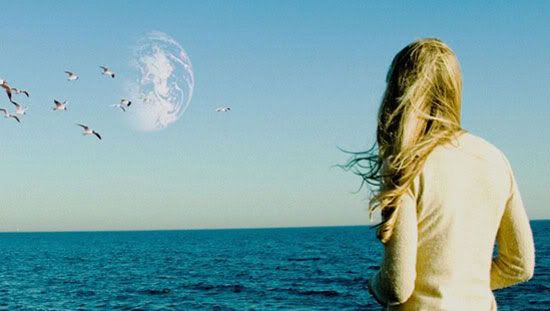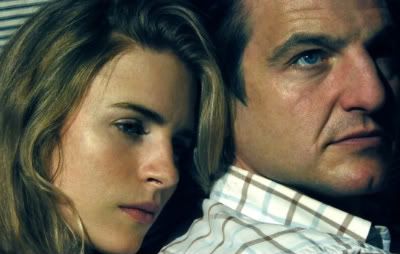
There is a moment in Another Earth in which one of the many voice-over commentators suggests that we are always striving to step outside of ourselves. To see ourselves objectively and converse as if our mind were a separate person entirely. Screenwriters Mike Cahill and Brit Marling (the director and the film’s star, respectively) take this thought to its most literal extreme: What if there was in fact an alternate earth that held an alternate you with perhaps even an alternate life?
Another Earth tells the story of Rhoda Williams, a young woman who, on the night it is discovered we may not be so alone, causes a fateful car accident that claims the lives of a pregnant mother and her young son, leaving the father in a coma. This exposition, as well as the initial introduction to the sci-fi conceit, sends the film off to a rocky start in terms of pacing, but finds its footing once we catch up to Rhoda four years later upon her release from prison.
The film seems to be frustrated by its need to explain the semantics of the concept surrounding “Earth 2” as well as the sequence of events that leads Rhoda to scoring a ticket aboard the maiden voyage, and it is in these moments where the greatest disconnect occurs. Details and plot devices are either carelessly tossed into dialogue, making it at times groaningly heavy-handed, not to mention the preposterous essay contest Rhoda enters to try and win a ticket, which she of course does.
The heart of the film lies in its human story, and Cahill is wise to pay most of his attention there. Rhoda, unable to live with what she has done, seeks out the sole survivor of the accident: John Burroughs (William Mapother), who has emerged from his coma to become a depressive recluse. She knocks on his door with the intention of apologizing, but when nerves get the best of her she fabricates a story about a cleaning service that leads her much farther into his life than she had expected, or perhaps wanted to go.
Once the film enters its second act, in which Rhoda and John become perhaps dangerously close, the two plotlines converge into the film’s true purpose: exploring the preoccupation with “what ifs” inherent in us all. Surely someone who has been through what Rhoda and John have would spend every moment of their days with such analysis. The idea of “Earth 2” allows them the rare chance to take these maddening questions seriously, on the promise that perhaps somewhere out there they really had made a different series of choices and none of this tragedy had ever occurred.
By the conclusion of the film, one is left with several unexpectedly existentialist questions, the biggest of all coming in the final image. With delicate (if at times uneven) performances from its leads, superb direction and editing from Cahill (the repeated image of Rhoda walking beside the looming Earth 2 on the horizon is breathtaking every time) Another Earth succeeds in its goal as a meditation on regret, forgiveness, and the infinite complexities of life which none of us can control. If nothing else, this is a unique film that deserves to be commended for its originality and spirit.

Pictured: Brit Marling and William Mapother